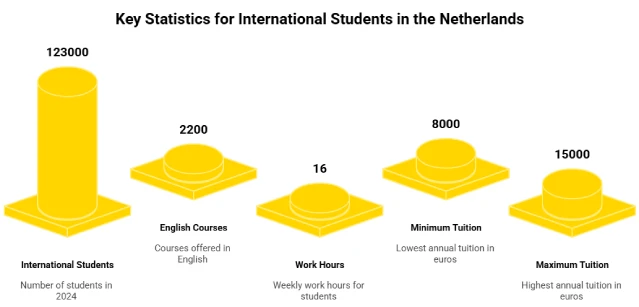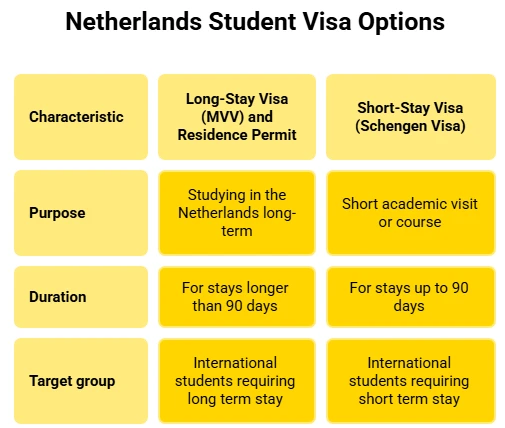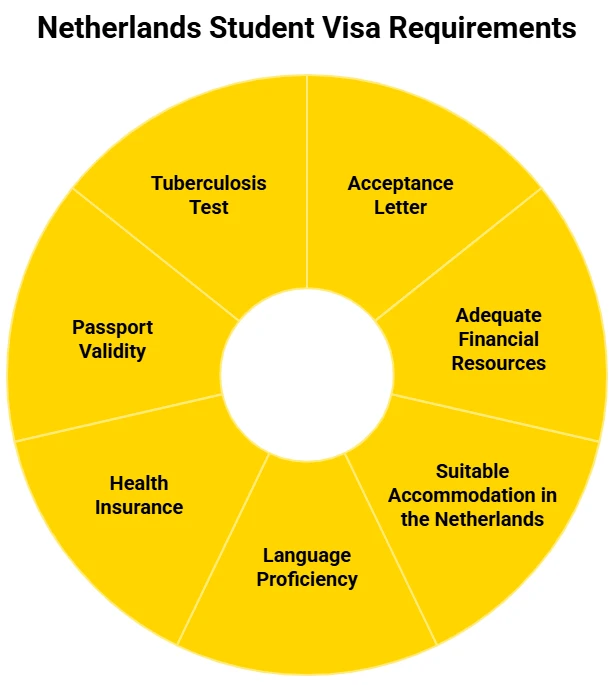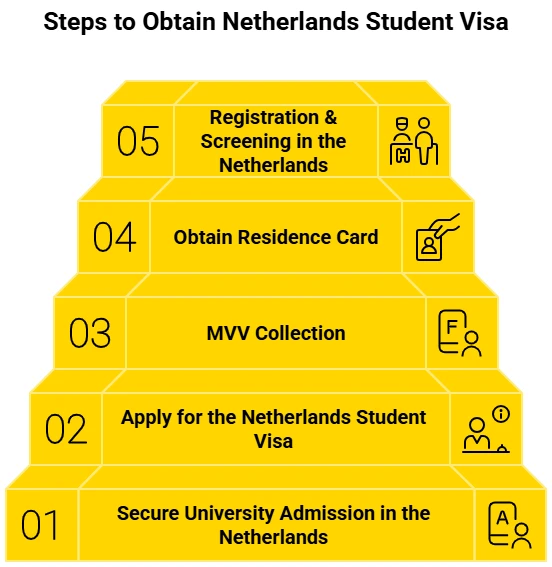Study in Netherlands
Don't know what to do?
Get Free Counselling
Study in Netherlands from Canada – A Complete Guide
The Netherlands is a popular destination for Canadian students because of its high-ranking universities, courses in English, and good job prospects after graduation. The country is known for its welcoming education system and lively student culture, giving international students a nice mix of school and social life.
- In 2024, over 123,000 international students chose to study in the Netherlands.
- Dutch schools provide over 2,200 courses in English.
- Netherland offers multiple work opportunities for international graduates.
- Tuition for students from outside the EU averages between €8,000 and €15,000 per year (CAD 11,500–21,500).
- Students with a residence permit can work up to 16 hours a week or full-time during the summer.

*Want guidance to apply for study in Netherlands? Sign up with Y-Axis for comprehensive support with the process.
Why Study in the Netherlands?
The Netherlands is a top European choice for international education. Canadian students can find strong academics, international experience, and career-focused education there. Dutch schools value new ideas, critical thinking, and practical skills, giving them a good global name.
With over 2,200 programs in English, a diverse student body, and good job prospects after graduation, the Netherlands provides a solid international study abroad. Its central spot in Europe also makes it easy to travel and network in different EU countries, with a good quality of life and resources for students.
Benefits of Studying in the Netherlands for Canadian Students
The benefits of studying in the Netherlands are given below.
- Many bachelor's, master's, and doctoral programs are taught in English.
- Dutch schools often feature in the top 200 globally, according to QS World University Rankings.
- The student body is diverse, and international students get great support.
- The Netherlands has good transportation, healthcare, and public services.
- Graduates can look for part-time work and jobs after school using the Orientation Year program.
Types of Student Visas for the Netherlands
International students can apply for the following Netherlands student visa, depending on their needs and requirements.
- Long-Stay Visa (MVV) and Residence Permit
- Short-Stay Visa (Schengen Visa)

Long-Stay Visa (MVV) and Residence Permit
Canadian students who want to study in the Netherlands full-time for more than 90 days need to get a Long-Stay Visa (MVV) and a Residence Permit (VVR). The MVV lets students enter the Netherlands, and the residence permit allows them to live and study there legally for their program.
Usually, Dutch universities apply for the visa and permit for the student through the Immigration and Naturalisation Service (IND). Once it's approved, the student picks up the MVV from the Dutch embassy or consulate in Canada. The residence permit is given after the student arrives in the Netherlands. Both are usually good for the whole study program, as long as the student keeps up with school.
Short-Stay Visa (Schengen Visa)
International students can visit the Netherlands without a visa for up to 90 days in a 180-day period because of the Schengen visa program. This is useful for Canadian students in short programs like summer courses or exchange programs that are less than 90 days.
However, students need to show proof of enrollment, enough money, valid travel insurance, and a ticket to leave the Netherlands. It's a good idea to check with the Dutch embassy or consulate before traveling, as the rules might be different depending on the program.
Work Rights with a Netherlands Student Visa
In the Netherlands, international students, such as Canadian citizens who have a valid study residence permit, can work if they meet some requirements. During the school year, students can work up to 16 hours each week. They're also permitted to work full-time in the summer, during June, July, and August. In either situation, employers need to get a work permit (TWV) for the student before they start working.
Students can also work for themselves if they sign up with the Dutch Chamber of Commerce and follow tax rules. They cannot do both part-time work and full-time summer work in the same year. Also, if an internship is part of a student's curriculum and is secured through a signed contract, they don't need a separate work permit.
Eligibility Criteria for Netherlands Student Visa
The eligibility criteria for Netherlands Student Visa are given below.
- You will need an acceptance letter from a Dutch school.
- You must have enough money to live on (€15,000 a year, or about CAD 21,500 in 2025).
- You need to show that you have a place to live in the Netherlands.
- You must meet the language standards. For English programs, this usually means an IELTS score of 6.0 or something similar.
- You must have health insurance that is good in the Netherlands.
- You need a valid Canadian passport that won't expire before your stay is over.
- If it applies, include a tuberculosis test statement—though Canadians usually don't need this.

Requirements to Apply for a Netherlands Student Visa
When applying for a Netherlands Student Visa, applicants should have these documents ready:
- A valid passport.
- An official acceptance letter from your Dutch school.
- Evidence that you can pay for your expenses (like a bank statement, scholarship info, or financial guarantee).
- Proof that you have health insurance coverage in the Netherlands.
- Completed application forms and payment for the visa.
- A tuberculosis test declaration (if needed).
How to Apply for a Netherlands Student Visa from Canada?
The application process to apply for Netherlands Student Visa is given below.
Step 1: Gain admission into a university in Netherlands.
Step 2: The University will then submit the applications for your entry visa (MVV) and residence permit to the Dutch Immigration Department (IND) for you.
Step 3: After approval, get your MVV from the Dutch embassy or consulate in Canada.
Step 4: Go to the Netherlands and pick up your residence card to pursue studies.
Step 5: Register with the local city hall and finish any needed health or TB screening.

Cost of Studying in the Netherlands for Canadian Students
The cost of studying in the Netherlands is given below.
| Expense | Amount (EUR) | Approximate in CAD |
|---|---|---|
| Tuition Fees | €8,000 – €15,000 / year | CAD 11,500 – CAD 21,500 |
| Living Expenses | €1,000 – €1,200 / month | CAD 1,400 – CAD 1,700 |
| Visa & Residence Fee | €228 (one-time, 2025 rate) | CAD 330 |
| Health Insurance | €40 – €120 / month | CAD 60 – CAD 170 |
Annual expenses usually vary between CAD 28,000 to CAD 38,000, based on school and its location.
Netherlands Student Visa Processing Time for Canadians
Detailed information about the processing time for Netherlands Student Visa is given below.
| Visa Type | Processing Time |
|---|---|
| Long-Stay Visa (MVV) + Residence Permit | 2 – 6 weeks (average) |
| Short-Stay (under 90 days) | Not required for Canadian citizens |
Most universities accept applications three to four months before a program begins. If you want to start a program in September, it is advised to begin the admission and visa process in April or May.
Scholarships and Financial Aid for Canadians Studying in the Netherlands
Detailed information about the scholarships and financial aid available in Netherlands for international students is given below.
| Scholarship Program | Description |
|---|---|
| Holland Scholarship | Offered to non-EEA students for bachelor’s and master’s programs; one-time grant of €5,000 |
| Orange Tulip Scholarship | Available to Canadian students applying to participating Dutch institutions |
| University-Specific Funding | Many institutions offer merit- and need-based scholarships for international students |
| Erasmus+ Exchange Grants | For short-term exchange or internship programs in the EU |
| Canadian Government Scholarships | Students may apply for Canadian study-abroad grants (e.g., GAC’s IES program) |
Post-Study Work Opportunities in the Netherlands
Those who graduate from a Dutch college may be able to get an Orientation Year permit. This lets them stay in the Netherlands for a year to find a job or start a business. They do not need a work permit for this time.
The fields having multiple job openings in Netherlands include:
- AI and data science
- Renewable energy and sustainability
- Engineering and logistics
- Life Sciences and Health Technology
- Finance and consulting
*Want to apply for Netherland Work Visa? Y-Axis is here to guide you with the process.
How Can Y-Axis Help You?
Y-Axis is a leading study abroad and immigration consultancy offering international education advice, assisting Canadian students who want to study in the Netherlands. Our group helps make sure your application goes smoothly and meets all requirements.
Our services include:
- Selecting a university and program that fits your background
- Preparing and submitting visa documents through the proper channels
- Planning your finances and applying for scholarships
- Finding health insurance and housing
- Getting support before and after you arrive in Netherlands
Frequently Asked Questions
